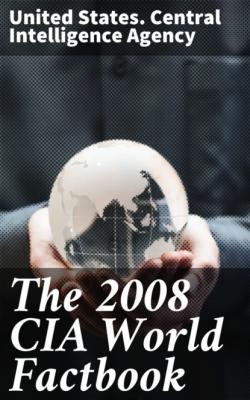The 2008 CIA World Factbook. United States. Central Intelligence Agency
Чтение книги онлайн.
Читать онлайн книгу The 2008 CIA World Factbook - United States. Central Intelligence Agency страница 384
 divisions:
divisions:
22 departments (departamentos, singular - departamento); Alta
Verapaz, Baja Verapaz, Chimaltenango, Chiquimula, El Progreso,
Escuintla, Guatemala, Huehuetenango, Izabal, Jalapa, Jutiapa, Peten,
Quetzaltenango, Quiche, Retalhuleu, Sacatepequez, San Marcos, Santa
Rosa, Solola, Suchitepequez, Totonicapan, Zacapa
Independence:
15 September 1821 (from Spain)
National holiday:
Independence Day, 15 September (1821)
Constitution:
31 May 1985, effective 14 January 1986; note - suspended 25 May 1993 by former President Jorge SERRANO; reinstated 5 June 1993 following ouster of president; amended November 1993
Legal system:
civil law system; judicial review of legislative acts; has not accepted compulsory ICJ jurisdiction
Suffrage:
18 years of age; universal; note - active duty members of the armed forces may not vote and are restricted to their barracks on election day
Executive branch:
chief of state: President Alvaro COLOM Caballeros (since 14 January 2008); Vice President Rafael ESPADA (since 14 January 2008); note - the president is both the chief of state and head of government head of government: President Alvaro COLOM Caballeros (since 14 January 2008); Vice President Rafael ESPADA (since 14 January 2008) cabinet: Council of Ministers appointed by the president elections: president elected by popular vote for a four-year term (may not serve consecutive terms); election last held 9 September 2007; runoff held 4 November 2007 (next to be held September 2011) election results: Alvaro COLOM Caballeros elected president; percent of vote - Alvaro COLOM Caballeros 52.8%, Otto PEREZ Molina 47.2%
Legislative branch:
unicameral Congress of the Republic or Congreso de la Republica (158 seats; members are elected by popular vote to serve four-year terms) elections: last held 9 September 2007 (next to be held in September 2011) election results: percent of vote by party - UNE 30.4%, GANA 23.4%, PP 18.9%, FRG 9.5%, PU 5.1%, other 12.7%; seats by party - UNE 48, GANA 37, PP 30, FRG 15, PU 8, CASA 5, EG 4, PAN 4, UCN 4, URNG 2, UD 1
Judicial branch:
Constitutional Court or Corte de Constitucionalidad is Guatemala's highest court (five judges are elected for concurrent five-year terms); Supreme Court of Justice or Corte Suprema de Justicia (13 members serve concurrent five-year terms and elect a president of the Court each year from among their number; the president of the Supreme Court of Justice also supervises trial judges around the country, who are named to five-year terms)
Political parties and leaders:
Center of Social Action or CASA [Eduardo SUGER]; Democracy Front or
FRENTE [Alfonso CABRERA]; Democratic Union or UD [Manuel CONDE
Orellana]; Encounter for Guatemala or EG [Nineth MONTENGRO]; Grand
National Alliance or GANA [Alfredo VILLA]; Guatemalan National
Revolutionary Unity or URNG [Hector NUILA]; Guatemalan Republican
Front or FRG [Efrain RIOS Montt]; National Advancement Party or PAN
[Ruben Dario MORALES]; National Unity for Hope or UNE [Alvaro COLOM
Caballeros]; Patriot Party or PP [Ret. Gen. Otto PEREZ Molina];
Unionista Party or PU [Fritz GARCIA]; Unity of National Change or
UCN [Sidney SHAW]
Political pressure groups and leaders:
Agrarian Owners Group or UNAGRO; Alliance Against Impunity or AAI;
Committee for Campesino Unity or CUC; Coordinating Committee of
Agricultural, Commercial, Industrial, and Financial Associations or
CACIF; Mutual Support Group or GAM
International organization participation:
BCIE, CACM, FAO, G-24, G-77, IADB, IAEA, IBRD, ICAO, ICC, ICRM, IDA,
IFAD, IFC, IFRCS, IHO, ILO, IMF, IMO, Interpol, IOC, IOM, IPU, ISO
(correspondent), ITSO, ITU, ITUC, LAES, LAIA (observer), MIGA,
MINUSTAH, MONUC, NAM, OAS, OPANAL, OPCW, PCA, RG, UN, UNCTAD,
UNESCO, UNIDO, UNIFIL, Union Latina, UNMIS, UNOCI, UNWTO, UPU, WCL,
WCO, WFTU, WHO, WIPO, WMO, WTO
Diplomatic representation in the US:
chief of mission: Ambassador Francisco VILLAGRAN de Leon chancery: 2220 R Street NW, Washington, DC 20008 telephone: [1] (202) 745–4952 FAX: [1] (202) 745–1908 consulate(s) general: Chicago, Denver, Houston, Los Angeles, Miami, New York, Providence, San Francisco
Diplomatic representation from the US:
chief of mission: Ambassador Stephen G. MCFARLAND embassy: 7–01 Avenida Reforma, Zone 10, Guatemala City mailing address: APO AA 34024 telephone: [502] 2326–4000 FAX: [502] 2326–4654
Flag description:
three equal vertical bands of light blue (hoist side), white, and light blue with the coat of arms centered in the white band; the coat of arms includes a green and red quetzal (the national bird) and a scroll bearing the inscription LIBERTAD 15 DE SEPTIEMBRE DE 1821 (the original date of independence from Spain) all superimposed on a pair of crossed rifles and a pair of crossed swords and framed by a wreath
Economy
Guatemala
Economy - overview:
Guatemala is the most populous of the Central American countries with a GDP per capita roughly one-half that of Argentina, Brazil, and Chile. The agricultural sector accounts for about one-tenth of GDP, two-fifths of exports, and half of the labor force. Coffee, sugar, and bananas are the main products, with sugar exports benefiting from increased global demand for ethanol. The 1996 signing of peace accords, which ended 36 years of civil war, removed a major obstacle to foreign investment, and Guatemala since then has pursued important reforms and macroeconomic stabilization. On 1 July 2006, the Central American Free Trade Agreement (CAFTA) entered into force between the US and Guatemala and has since spurred increased investment in the export sector. The distribution of income remains highly unequal with about 56% of the population below the poverty line. Other ongoing challenges include increasing government revenues, negotiating further assistance from international donors, upgrading both government and private financial operations, curtailing drug trafficking and rampant crime, and narrowing the trade deficit. Given Guatemala's large expatriate community in the United States, it is the top remittance recipient in Central America, with inflows serving as a primary source of